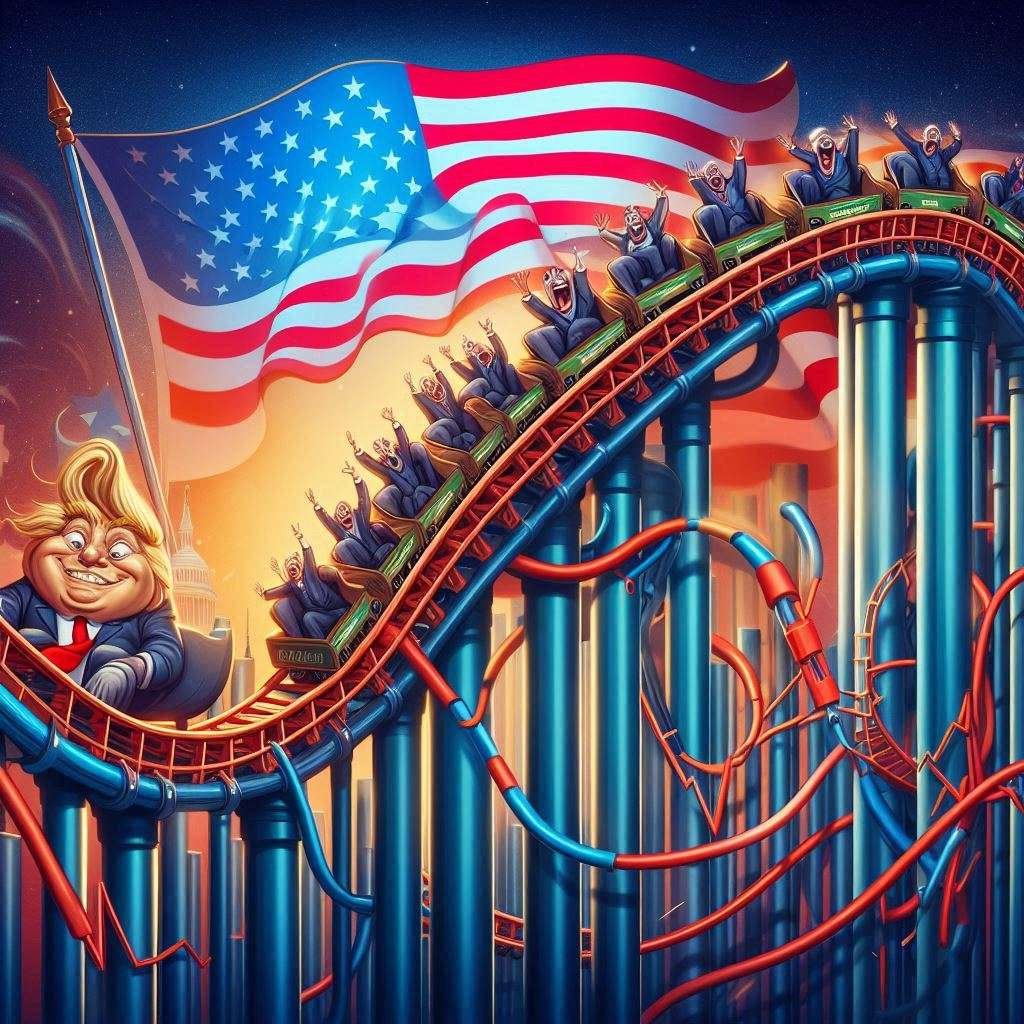Hey folks! Let’s chat about how the U.S. presidential election can actually be a big deal for financial markets. Think of it like this: elections are kind of like a major shake-up that can make investors and traders lean in and pay close attention! 🇺🇸
What’s the Big Deal? The presidential race isn’t just about who gets the coolest office in Washington – it can totally impact your investments and the entire economic playground!
Here’s the Scoop:
- Economic Rollercoaster:
- Different candidates = Different economic game plans
- Imagine tax changes, new business rules, and government spending that can make investors either cheer or get nervous
- Some plans make investors think, “Ooh, this could be good for business!” 💡
- Industry Spotlight:
- Some industries are like election weather vanes
- Energy, healthcare, tech, and defense sectors? They’re basically sitting on the edge of their seats during elections
- A new policy could send their stock prices on a wild ride 🎢
- Market Mood Swings:
- Elections bring uncertainty – and markets REALLY don’t love uncertainty
- Investors might get a bit cautious and start reshuffling their investment strategies
- The periods before and after elections? Total drama zone for markets
- Global Connections:
- How a candidate talks about international relationships can make global markets lean in
- Trade policies and diplomatic approaches? Total investor conversation starters
- Money Management Magic:
- New leadership can signal fresh approaches to economic management
- Even subtle hints about economic direction can make investors perk up
Pro Tip: Remember, markets are super complex. Elections are just one piece of a massive, intricate puzzle!
U.S. Presidential Elections and Market Dynamics
Market Impact Table:
| Election Factor | Potential Market Effect | Investor Sentiment |
|---|---|---|
| Tax Policies | Stock market volatility | Cautious to Optimistic |
| Regulatory Changes | Sector-specific impacts | Neutral to Concerned |
| Trade Agreements | International market reactions | Uncertain to Hopeful |
| Government Spending | Economic growth expectations | Speculative |
| Monetary Policy | Interest rates and investment strategies | Adaptive |
FAQ: Election Market Mysteries Unveiled
Q: How quickly do markets react to election results? A: Markets can respond almost instantly! Sometimes within hours or days of an election outcome, as investors quickly assess potential economic implications.
Q: Do all presidential elections impact markets the same way? A: Nope! Each election is unique. Factors like economic conditions, candidate platforms, and global circumstances make each election’s market impact different.
Q: Which industries are most sensitive to election outcomes? A: Key sensitive sectors include:
- Healthcare (insurance, pharmaceutical regulations)
- Energy (environmental policies)
- Defense (military spending)
- Technology (trade policies, regulation)
- Financial Services (banking regulations)
Q: Can international investors be affected by U.S. elections? A: Absolutely! U.S. elections can influence global investment strategies, currency values, and international trade relationships.
Additional Insights:
- Historical data shows markets typically prefer predictability
- Diversification is key during election-related uncertainties
- Long-term investment strategies often outperform short-term reactive moves
Pro Investment Tip: 🌟 Don’t make hasty investment decisions based solely on election outcomes. Consult financial professionals and maintain a balanced, long-term perspective.
U.S. Presidential Elections Market Impact Timeline
2020 Election: Trump vs. Biden
- Market Reaction: Initial volatility, followed by strong recovery
- S&P 500 Performance:
- Election Day (Nov 3): Slight dip
- Year-End 2020: +16.3% gain
- Key Factors: COVID-19 pandemic, stimulus packages, tech sector growth
2016 Election: Trump vs. Clinton
- Market Reaction: Unexpected Trump victory caused initial shock
- S&P 500 Performance:
- Immediate post-election: Quick recovery
- Year-End 2016: +9.5% gain
- Key Factors: Tax cut expectations, deregulation promises
2012 Election: Obama vs. Romney
- Market Reaction: Stable, moderate growth
- S&P 500 Performance:
- Year-End 2012: +13.4% gain
- Key Factors: Economic recovery, healthcare policy
2008 Election: Obama vs. McCain
- Market Reaction: Extreme volatility due to financial crisis
- S&P 500 Performance:
- Election Year: -38.5% (global financial crisis)
- Key Factors: Banking sector bailout, economic stimulus
2004 Election: Bush vs. Kerry
- Market Reaction: Relatively steady
- S&P 500 Performance:
- Year-End 2004: +8.9% gain
- Key Factors: War on terror, moderate economic growth
2000 Election: Bush vs. Gore
- Market Reaction: Extended uncertainty due to Florida recount
- S&P 500 Performance:
- Election Year: -10.1% (dot-com bubble burst)
- Key Factors: Tech sector collapse, contested election results
Key Observations
- Not all elections cause significant market disruptions
- Long-term economic fundamentals often matter more than election outcomes
- Market resilience is a consistent theme across election cycles
Disclaimer: Past performance does not guarantee future results. Market reactions are influenced by multiple complex factors.
Featured
Trading View They have wonderful technical analysis indicators and charts and can be used with many different brokerage companies. Many of the videos i post about trading strategies use the technical indicators on TradingView.


